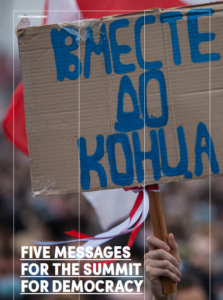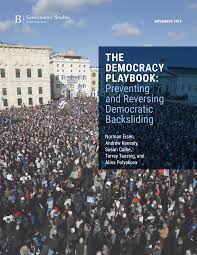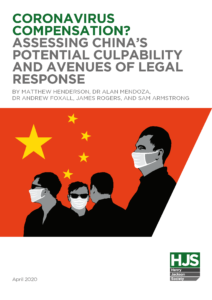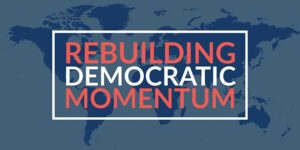 The list of invitees to this week’s Summit for Democracy reflects political considerations more than democratic values, resulting in “a tangle of contradictions and missed opportunities,” The Economist suggests.
The list of invitees to this week’s Summit for Democracy reflects political considerations more than democratic values, resulting in “a tangle of contradictions and missed opportunities,” The Economist suggests.
Attendees will include nearly all countries Freedom House considers “free,” which can safely be considered democracies. But another tranche of invitees, such as Zambia (52) and Moldova (61), are considered only “partly free,” it observes:
Three states—the Democratic Republic of Congo (20), Iraq (29) and Angola (31)—are rated “not free”. Several countries which were not invited, such as Bolivia (66) and Sierra Leone (65), rank well ahead of others who were. …..India (67), Brazil (74) and Poland (82) have all slipped down the Freedom House rankings in recent years, yet they were too politically significant to be left off the list. Bosnia and Herzegovina (53) ranks just behind its Balkan neighbour Kosovo (54) and could use American support at a time of increasing political polarisation, but was not invited.
The summit risks becoming a self-inflicted wound, according to James Goldgeier, a visiting fellow at the Brookings Institution and a professor of international relations at American University, and Bruce Jentleson, professor of public policy and political science at Duke University. But given that it is happening anyway, there are ways in which the administration can mitigate the most likely pitfalls, they write for POLITICO:
 First, don’t be afraid to call out your guests. Taking geopolitics into account, even when it means compromising your ideals somewhat, is a fact of life in foreign policy…. Still, the risk is that leaders may walk away able to say the United States recognized them as democratic. Each needs to get the message that their invitation does not mean the Biden team is letting them off the hook regarding their undemocratic trends.
First, don’t be afraid to call out your guests. Taking geopolitics into account, even when it means compromising your ideals somewhat, is a fact of life in foreign policy…. Still, the risk is that leaders may walk away able to say the United States recognized them as democratic. Each needs to get the message that their invitation does not mean the Biden team is letting them off the hook regarding their undemocratic trends.- Second, don’t let democracy alone dictate whom you work with. Another challenge for Biden at the summit will be affirming the shared affinities among democracies without further dividing the world into two camps. Ideology and interests do not always align. …Meanwhile, democracies cannot afford to be opposed to autocracies on every issue. In the Cold War, the United States and Soviet Union shared interests on issues like arms control and smallpox eradication. Today, the United States and China (as well as Russia) have a shared interest in combating climate change, reducing the risks of nuclear proliferation and fighting pandemics. Moreover, China is intertwined in the global economy in a way the Soviet Union never was.
- Third, use civil society groups to hold countries accountable. A common critique of the summit — which we agree with — has been that it will be nearly impossible to force countries to deliver on the democratic commitments they are being asked to make. …To ensure participants are held accountable, Biden should fully endorse the June 2022 Fifth Copenhagen Democracy Summit, whose more than 500 participants will undertake a “civil society stocktaking of the commitments made” at Biden’s summit.
Daily chart – The #SummitforDemocracy is not all that democratic https://t.co/7MmVbAo9Wr
— Democracy Digest (@demdigest) December 6, 2021
Tipping the balance in favor of democracy, human rights, and a more just and equitable world will require unrelenting persistence and hard work, according to Susan Corke, Norman Eisen, Jonathan Katz, Andrew Kenealy, James Lamond, Alina Polyakova, and Torrey Taussig, the authors of Brookings’ Democracy Playbook: Democracy Summit Edition. They outline “10 Commitments” for global democratic renewal – thematic clusters of actionable initiatives – for state and non-state stakeholders as they consider their Summit deliverables.
 The summit’s success rests in large part on the requirement that each participating government make concrete commitments to bolster democracy at home and abroad—and execute them over the course of 2022. For these commitments to enable the summit to make good on its overall mission, a few factors will be crucial, argues Frances Z. Brown, a senior fellow and co-director of Carnegie’s Democracy, Conflict, and Governance Program:
The summit’s success rests in large part on the requirement that each participating government make concrete commitments to bolster democracy at home and abroad—and execute them over the course of 2022. For these commitments to enable the summit to make good on its overall mission, a few factors will be crucial, argues Frances Z. Brown, a senior fellow and co-director of Carnegie’s Democracy, Conflict, and Governance Program:
- First, participant commitments must be specific and tangible. At risk of stating the obvious, yet necessary—they should also be meaningful.
- Third, if the summit’s success is a priority to Biden, following up on other countries’ commitments should be central to the U.S. government’s own work, as well. U.S. officials will need to articulate how they, too, will be monitoring country commitments and responding to noncompliance. …
- More broadly, in the coming year, the Biden administration will need to shift from a focus on the tactics of summit planning to a strategy of global democracy reinforcement. Holding a summit is not an end goal in itself—but supporters of democracy everywhere hope that it succeeds in jump-starting progress toward broader democratic renewal.
![]() Despite the Biden administration’s hopes of rallying a broad coalition of democratic governments against the resurgent tides of authoritarianism and backsliding democracies, many in South Asia are deeply skeptical, says Aqil Shah, a visiting scholar in Carnegie’s South Asia Program and a contributor to the National Endowment for Democracy’s Journal of Democracy:
Despite the Biden administration’s hopes of rallying a broad coalition of democratic governments against the resurgent tides of authoritarianism and backsliding democracies, many in South Asia are deeply skeptical, says Aqil Shah, a visiting scholar in Carnegie’s South Asia Program and a contributor to the National Endowment for Democracy’s Journal of Democracy:
- First, critics argue that the United States needs to fix its democratic deficits before preaching democratic values to India and other nations. South Asian countries have watched U.S. democracy backslide in recent years….
- Second, while the Biden administration has claimed that a shared commitment to democratic values is the bedrock of the India-U.S. bilateral relationship, it has remained silent on the steady degradation of Indian democracy under the Hindu nationalist government of Prime Minister Narendra Modi, which Washington sees as a crucial democratic partner in its Indo-Pacific strategy to balance China…..
- Third, while all the other South Asian countries are rated “partly free” by Freedom House, strategic interests rather than democratic values also seem to explain who is in and who is out of the summit.
China has launched a campaign to discredit what it calls US-style democracy in advance of the summit, The Guardian reports.
 The ruling Communist Party has pointed to the country’s low Covid-19 numbers — fewer than 5,000 people have died — as evidence that China’s authoritarian model is superior to the rest of the world, even as its borders remain closed and ordinary citizens find their personal freedom severely restricted during outbreaks, The New York Times adds.
The ruling Communist Party has pointed to the country’s low Covid-19 numbers — fewer than 5,000 people have died — as evidence that China’s authoritarian model is superior to the rest of the world, even as its borders remain closed and ordinary citizens find their personal freedom severely restricted during outbreaks, The New York Times adds.
“What we need is collective freedom, social freedom and national freedom,” Zhong Nanshan, China’s top disease expert, said. “Only with these freedoms can we have individual freedom.”
On Saturday, the State Council, China’s cabinet, released a white paper, titled “China: Democracy That Works,” which claims that the regime’s “whole-process people’s democracy” provides a “sound institutional framework” for a “new model” of democratic governance that guarantees all people’s right to a happy life.
The paper has been heavily promoted on Twitter by state media and government accounts since its release on Saturday, VOA reports. A Twitter video produced by the State Council Information Office says, “China did not follow the established path of Western countries in its modernization drive. Similarly, China did not duplicate Western models of democracy, but created its own.”
Political fantasies aside, China ranked 151 in the Economist Intelligence Unit’s 2020 democracy Index, placing it on par with Bahrain, Iran and Sudan, VOA adds.

On the eve of the Summit for Democracy, the National Endowment for Democracy (NED) will host a forum featuring some of the world’s most important voices from the frontlines of the democratic struggle, including this year’s Nobel Peace Prize winner, Philippine journalist Maria Ressa.
Activists from Hong Kong, Nicaragua, Nigeria, and Russia will discuss global challenges to democracy in conversation with US Legislators. Some of America’s most dedicated and experienced democracy advocates will share their insights and expertise on how to rebuild democratic momentum. Former heads of government who helped lead democratic change will reflect on how to sustain post-transition democracy. December 08, 2021. 12:30 pm – 02:00 pm. RSVP







